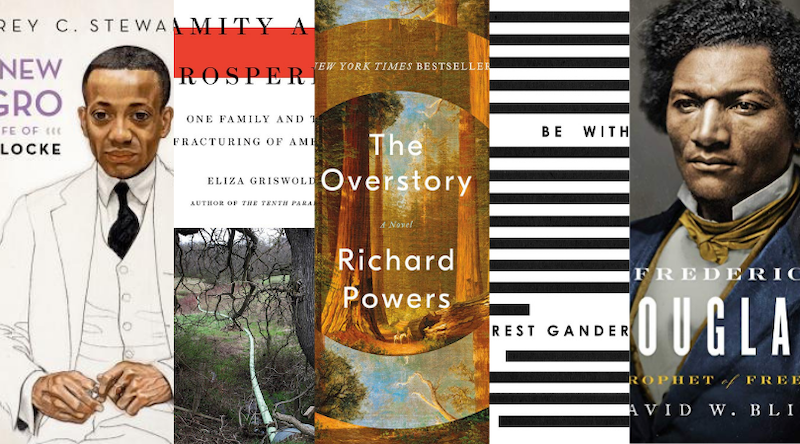
Earlier this afternoon, from the Columbia School of Journalism in New York City, the 103rd annual Pulitzer Prizes were announced.
In the Arts and Letters categories, the below five titles received the prestigious honor for 2019.
Congratulations to all the winners and finalists!
The Overstory by Richard Power
“…his monumental novel The Overstory accomplishes what few living writers from either camp, art or science, could attempt. Using the tools of story, he pulls readers heart-first into a perspective so much longer-lived and more subtly developed than the human purview that we gain glimpses of a vast, primordial sensibility, while watching our own kind get whittled down to size…. The descriptions of this deeply animate place, including a thunderstorm as experienced from 300 feet up, stand with any prose I’ve ever read. I hesitate to tell more, and spoil the immense effort Powers invests in getting us into that primal forest to bear witness … The science in this novel ranges from fun fact to mind-blowing, brought to us by characters—some scientists, mostly not—who are sweet or funny or maddening in all the relatable ways. The major players number more than a dozen, all invested with touching humanity, and they arrive with such convincing, fully formed résumés, it’s hard to resist Googling a couple of them to see if they’re real people.”
–Barbara Kingsolver (The New York Times Book Review)
Finalists:
There There by Tommy Orange
The Great Believers by Rebecca Makkai
Amity and Prosperity: One Family and the Fracturing of America by Eliza Griswold
“Amity and Prosperity tells with vivid detail the contours of daily life in Washington and Greene counties … The book’s subtitle, ‘One Family and the Fracturing of America,’ is a significant play on words as well as this riveting book is very much about the contested practice of industrial fracking … Ms. Griswold’s descriptions are spot on and clearly recognizable … Although the story is a page-turner exposing corporate injustices, dishonesty and public malfeasance…it is still appealing to read about places one knows … Ms. Griswold is an energetic writer, and the characters she writes about are themselves colorful, raw and dogged … not only a glimpse into postindustrial small towns and the environmental consequences of fracking but also a legal thriller worthy of any novel by John Grisham.”
–Byron Bolger (The Pittsburgh Post-Gazette)
Finalists:
In a Day’s Work: The Fight to End Sexual Violence Against America’s Most Vulnerable Workers by Bernice Yeung
Rising: Dispatches from the New American Shore by Elizabeth Rush
History
Frederick Douglass: Prophet of Freedom by David W. Blight
“David Blight has written the definitive biography of Frederick Douglass. With extraordinary detail he illuminates the complexities of Douglass’s life and career and paints a powerful portrait of one of the most important American voices of the 19th century … Blight is masterful in handling this material. In these moments, the pace of this big book picks up; the details pull you in; and if only just for a moment, the larger-than-life image dips and we see the man.”
–Eddie S. Glaude Jr. (The Boston Globe)
American Eden: David Hosack, Botany, and Medicine in the Garden of the Early Republic by Victoria Johnson
Civilizing Torture: An American Tradition by W. Fitzhugh Brundage
Biography

The New Negro: The Life of Alain Locke by Jeffery C. Stewart
“…a vitally important, astonishingly well researched, exhaustive biography of the brilliant, complex, flawed, utterly fascinating man who, if he did not start the movement, served as its curator, intellectual champion, and guiding spirit … His account of Locke’s life is detailed, sometimes astoundingly so, but never descends into tedium. More important, he displays a thorough grasp of the intellectual challenges Locke took on … On his death, in 1954, Locke left behind achievements that deserve to be more widely celebrated, and this biography represents a serious, worthy attempt to get the party started.”
–Clifford C. Thompson (The Wall Street Journal)
Finalists:
Proust’s Duchess: How Three Celebrated Women Captured the Imagination of Fin-de-Siècle Paris by Caroline Weber
The Road Not Taken: Edward Lansdale and the American Tragedy in Vietnam by Max Boot
Poetry
Be With by Forrest Gander
“Poetry often creates a supernatural-seeming rapport with the dead, but rarely has the communication between worlds felt so eerily reciprocal … In Be With, he is at once adamant about the ineffability of grief and committed to getting his inchoate ‘grief-sounds’ somehow into words. The book’s sputtering, flinching style, with its syntactical dead ends and missed connections, feels like both an accommodation to the necessity of language and proof of its inadequacy … The book’s title gives away its most tragic insight. ‘Be with’: the phrase is stripped of its object; the beloved has been ripped from the world. Reciprocity is suddenly broken, as though one player in a game had walked off the court mid-volley … Gander’s poems call to mind those Thomas Hardy wrote after the sudden death of his wife, Emma. Hardy’s verse skips over his immediate, painful past to a moment ‘when our day was fair,’ dwelling on the uncanny traces his wife left behind in ‘a room on returning thence.’ Gander shares the intensity of Hardy’s grief—his morose fixation on moments squandered. The poems in Be With recall the happy parallel paths in life and in art that he and [his late wife C.D.] Wright followed—always within a holler of each other … The book as a whole…is a self-suturing wound, equal parts bridge and void.”
–Dan Chiasson (The New Yorker)
Finalists:
feeld by Jos Charles
Like by A. E. Stallings
*
Every Pulitzer Prize for Fiction Winner of the 21st Century
Every Pulitzer Prize for Nonfiction Winner of the 21st Century

